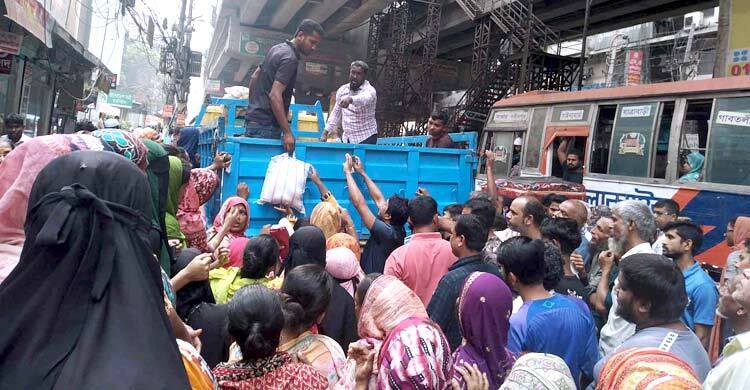
In a market spiralling out of control with soaring commodity prices, low-income families are drowning. For them, the Trading Corporation of Bangladesh (TCB) truck sales—offering subsidised essentials like oil, sugar, and lentils—are a lifeline in a sea of despair.Since dawn, crowds of weary men and women, clutching hope and empty bags, swarm intersections across Dhaka, chasing the promise of affordable relief. But what they find is chaos, heartbreak, and a system buckling under their desperation.On Tuesday (February 25) and Wednesday (February 26), this reporter witnessed the unfolding drama at 10 TCB sale points in the capital.With Ramadan looming, the stakes are higher, the lines longer—300 to 400 people snaking behind each truck before it even arrives. In densely packed neighbourhoods, the numbers swell further, a tide of hunger and need. Yet, only 200 tokens are handed out per truck, leaving hundreds to trudge home empty-handed after hours in the blistering sun. The scene is a battlefield of survival. Fights erupt. Elbows jab. The elderly and frail are shoved aside, their pleas lost in the clamour.
Safia Begum, over 70, limped away defeated in Mouchak after three days of trying. “I don’t have the strength,” she whispered, her voice trembling. “I’ve been pushed and shoved, but I still can’t get a token.” Nearby, Abul Hossain, an elderly man, watched his spot in line evaporate in the chaos. “I was number 20 before the truck came,” he said. “By the time tokens were given, I was 76. Will I even get anything?”
For those who prevail, the prize is modest but precious: two litters of soybean oil (Tk 100 vs. Tk 200 in the market), two kilograms of lentils and chickpeas (Tk 60 vs. Tk 120), one kilogram of sugar (Tk 70 vs. Tk 125), and 500 grams of dates (Tk 156 vs. Tk 200-300). It’s a lifeline that slashes costs by half—enough to make hours of waiting, shoving, and even fighting worth it. “Despite all this trouble, I got the goods,” said Nasima Akhter, a rare smile breaking through her exhaustion. “In the market, I couldn’t afford them. Now, Ramadan feels possible.”
But triumph is fleeting, and the losses sting deeper. At Karwan Bazar on Wednesday, a truck rolled in at 11:00am to a crowd of 150-200. By 2:00pm, the goods were gone, and at least 100 people—including latecomers who saw the endless queue and gave up—left with nothing. Maryam, a woman caught in a scuffle there, accused a group of women of ganging up to snatch her token. “She pushed me from behind and took it,” she fumed, as shouts and shoves erupted around her. After 20 minutes, bystanders broke up the fight, but the damage was done.
The dealers are overwhelmed. Palash Uddin of Adrik International told Jago News, “Oil’s scarce, prices are sky-high, and here it’s half the cost. It’s a war out there—people are fighting because there’s just not enough.”
Aminul Islam, a dealer’s representative, admitted, “We can barely manage. We use locals to hand out tokens, but the chaos is unstoppable.”
Some allege favouritism, with buyers like Sumi—who arrived at 8:00am only to be pushed out—claiming, “They give tokens to their friends first.”
The weakest suffer most. Women brawl in separate lines, their dignity fraying with every push. The elderly falter, unable to compete. Enamul Islam, a customer, shook his head: “Civilized people can’t survive this. No decent woman would come unless forced by need.”
Dealers’ employees, stretched thin, snap back—abuse and shoving have become routine.
TCB plans to serve 12 lakh families via truck sales nationwide during Ramadan, plus 57 lakh smart-card holders with subsidised goods.
In Dhaka, 50 trucks roll out daily, but the open-access sales breed anarchy compared to the orderly smart-card system. Before trucks arrive, men and women self-organise into lines, vowing fairness. Yet, the moment the engine roars in, discipline collapses—hundreds surge forward, breaking ranks, scrambling for tokens.
The fallout is grim. A dealer’s representative shrugged, “With this crowd, chaos is inevitable. People don’t listen.”
Sumi’s frustration echoed a broader cry: “I was here at 8:00am, but they shoved me to the back.” For every Nasima who walks away relieved, countless others—Safia, Abul, Maryam—bear the weight of defeat, their Ramadan hopes dimming in the dust of Dhaka’s streets.

